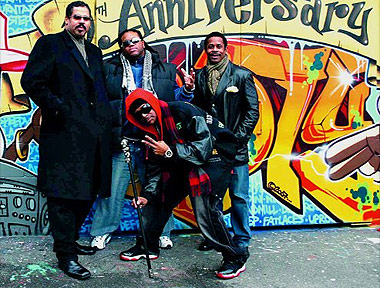
| HOME |
| NERVE |
| REVIEWS |
| ARCHIVE |
| EVENTS |
| LINKS |
| ABOUT US |
| CONTRIBUTORS |
| BACK ISSUES |
| CONTACT US |
 The Sugarhill
Gang/Petebox/The Elementals
The Sugarhill
Gang/Petebox/The Elementals
The Masque, Seel Street
27th May 2010
Reviewed by Richard Lewis
In the dark, red-lit smoky atmosphere of The Masque, The Elementals are currently tearing up the stage. Like an extended, hyperactive version of the Beastie Boys, attired in suits and ties, replete with a horn section, the group bound endlessly round the stage.
Initially looking like they’ve arrived at the wrong venue - they could be suited, booted and booked to play at the Philharmonic Hall - things get underway with the four man frontline scrambling about the stage, their opening salvo a frantic paean to fast food and takeaways.
Similar to The Specials if they had been into hip-hop as opposed to ska and reggae, the band mix straight ahead old school hip-hop with lounge interludes and bellowed choruses. Throwing in myriad tempo changes and plenty of call and response routines, the endless energy displayed by the frontman is quickly reciprocated by the audience.
Describing themselves self deprecatingly as a ‘supergroup’ before third track, ‘Share Some Words’, the musicians and vocalists blend seamlessly, a difficult task considering the group are nine members strong. Asking if the audience are interested in doing some skanking during ‘Do What You Do’, the floor quickly resembles an edition of Top of the Pops circa 1979, as the audience engages in a mass outbreak of it.
Pointing out the lineage hip-hop shares with dub, roots and reggae, the group act as a perfect entrée to the Sugarhill Gang, playing the music that was around immediately prior to the arrival of hip-hop in the late 1970s. Parts of the set sound similar to the music recently heard at The Picket for Africa Oye night, as hip-hop absorbed dub’s deep basslines. The band draw their set to a close with a genre-straddling medley which includes a horn-driven cover of ‘Smooth Criminal’.
Following The Elementals, beatboxer Petebox is similarly riotous, albeit on his own. Beginning with a demonstration of what makes up a hip-hop track with a series of scratching and sampling impressions, he summons up a bass sound as powerful as any of the other acts on the bill tonight. Sounding at points like four different sound sources played simultaneously, his set acts as a perfect tutorial in how build a hip-hop track from the ground up.
Recording and looping his voice to add additional layers on top of one another, he branches off into crowd pleasing renditions of Dizzee Rascal’s ‘Fix Up, Look Sharp’ and The White Stripes’ ‘Seven Nation Army’. Concluding with a cover of Basement Jaxx’s ‘Where’s Your Head At’ - built from its ominous bass rumble, through to hi-hats, kick drum, and finally vocals - he sings the entire track, proving he can easily handle vocals as well.
Taking to the stage following a James Brown-style announcer, headliners the Sugarhill Gang waste no time in working the audience, starting with call and response routines. Accurately describing themselves as the first rap group - as there’s still some debate raging regarding this - the group talk frequently between songs about what inspired them to craft ‘Rapper’s Delight’, the first hip-hop track to achieve worldwide recognition.
Mentioning their recent induction into the Rock n’ Roll Hall of Fame, and paying tribute to The Beatles' hometown, the group set about performing the material that inspired the track. Beginning with the old-school format of three MCs and a DJ, the group switch to live instrumentation, consisting of drums, percussion and bass, and work their way through a myriad of styles. Throwing Cuban Salsa, hard rock and soul tracks into the mix, the group play extracts from ‘Billie Jean’, The Chi-Lites sample later used by Beyonce for ‘Crazy in Love’ and Grand Master Flash’s seminal track ‘The Message’.
There can only be one track to finish with however, and we are treated to the deluxe XL version of it. Building slowly from its sample of Chic’s ‘Good Times’ through to the arrival of the three MCs, ‘Rapper’s Delight’s’ ‘hip-hop you don’t stop’ lyric proves beyond doubt they were the first to take the genre overground in 1979, ushering in a whole new musical era, and what is now the world’s biggest selling genre.